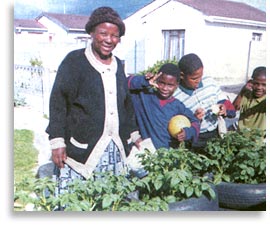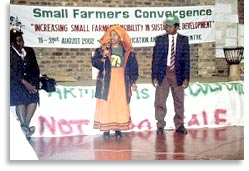|
Interview with Sindiswa Mahuza
Unemployed Women Create Vegetable Gardens in Khayelitsha "By having land people will create jobs for themselves" Johannesburg, South Africa
Sindiswa Mahuza: My name is Sindiswa Mahuza. I'm working for an organization called Abalimi Bezekhaya in Khayelitsha. We are working with unemployed women and some men. These unemployed women are women who used to sit on the side. We approach and request from them if they would like to have vegetable gardens so they can feed their families. We give them training courses so they can have clear ideas on how to plant in Capetown. We give them three days training and then after the training, on the fourth day, we give them resources -- cabbage, spinach, seed like beetroot, carrot, turnips and so forth.
We also help them to organize themselves into groups and encourage them to manage their finances. After three or five years we will leave them so they can sustain themselves. When their harvest is ready they sell it to the community and then to the market. At the moment, we are looking for more marketplaces where all kinds of vegetables can be sold. In Motion Magazine: How many people do you work with? Sindiswa Mahuza: We've got a lot of groups in all areas in Khayelitsha. We have plus/minus fifty-four groups. As an example, we've got a group called Siyazama Community Allotment Garden. This garden is at Khayelitsha in Makaza. We've got 10 women at that garden and five men. In this garden they have a market site and a site which they plant for their homes to feed their families. Fifteen families, (which works out to be approximately 90 people) are directly dependent on the produce. In Motion Magazine: When did you start the project? Sindiswa Mahuza: ABALIMI began in 1982, Siyazama started in 1997. In Motion Magazine: It's in the city or in the rural areas? Sindiswa Mahuza: It's in the city. In Motion Magazine: Can you tell me why you thought it was important to come to this Small-Scale Farmers Convergence? Sindiswa Mahuza: It is important for us to come here because there's no land for the people to grow more vegetables, as they want, and the people don't have jobs. By having land people will create jobs for themselves, so they can feed their families, the community, the world in wide. In Motion Magazine: Do you think your project is successful?
By having a garden, they can get money to sustain themselves. Also, with the garden they can make their own seedlings and sell the seedlings to the community to generate money for themselves. In Motion Magazine: Is there anything else you'd like to say?Sindiswa Mahuza: Other projects which we do involve communities asking for land in the school yards so that the communities have vegetable gardens in the schools. The purpose in having a garden at a school is to work with the parents and children who are at that school who have nothing to eat. When those parents who are unemployed have a garden at the school they can give a donation to the school to cope with those children who are really in need for something to eat. Also we do greening at the schools -- planting trees, shrubs, herbs, groundcover, and so forth. |
||||||||||||||||||||||||||||||||||||||||||||||||||||||
| Published in In Motion Magazine, March 8, 2003 | ||||||||||||||||||||||||||||||||||||||||||||||||||||||
If you have any thoughts on this or would like to contribute to an ongoing discussion in the  What is New? || Affirmative Action || Art Changes || Autonomy: Chiapas - California || Community Images || Education Rights || E-mail, Opinions and Discussion || En español || Essays from Ireland || Global Eyes || Healthcare || Human Rights/Civil Rights || Piri Thomas || Photo of the Week || QA: Interviews || Region || Rural America || Search || Donate || To be notified of new articles || Survey || In Motion Magazine's Store || In Motion Magazine Staff || In Unity Book of Photos || Links Around The World NPC Productions Copyright © 1995-2018 NPC Productions as a compilation. All Rights Reserved. |
||||||||||||||||||||||||||||||||||||||||||||||||||||||




